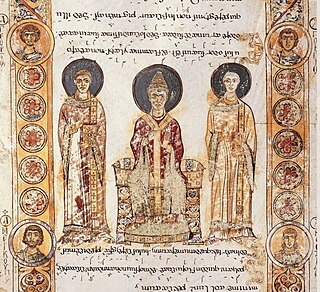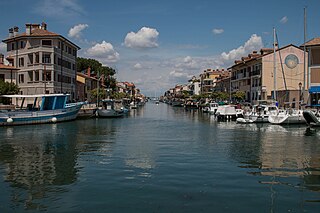Related Research Articles
Pope Gregory II was the bishop of Rome from 19 May 715 to his death. His defiance of Emperor Leo III the Isaurian as a result of the iconoclastic controversy in the Eastern Empire prepared the way for a long series of revolts, schisms, and civil wars that eventually led to the establishment of the temporal power of the popes.

Pope Gregory III was the bishop of Rome from 11 February 731 to his death on 28 November 741. His pontificate, like that of his predecessor, was disturbed by Byzantine iconoclasm and the advance of the Lombards, in which he invoked the intervention of Charles Martel, although ultimately in vain. He was the last pope to seek the consent of the Byzantine exarch of Ravenna for his election, the last pope of Syrian origin, and the last non-European pope until the election of Pope Francis more than 1,271 years later in 2013.
Year 568 (DLXVIII) was a leap year starting on Sunday of the Julian calendar. The denomination 568 for this year has been used since the early medieval period, when the Anno Domini calendar era became the prevalent method in Europe for naming years.

Aquileia is an ancient Roman city in Italy, at the head of the Adriatic at the edge of the lagoons, about 10 kilometres (6 mi) from the sea, on the river Natiso, the course of which has changed somewhat since Roman times. Today, the city is small, but it was large and prominent in classical antiquity as one of the world's largest cities with a population of 100,000 in the second century AD and is one of the main archaeological sites of northern Italy. In late antiquity the city was the first city in the Italian Peninsula to be sacked by Attila the Hun.

Pope John XIX, born Romanus, was the Bishop of Rome and ruler of the Papal States from 1024 to his death. He belonged to the family of the powerful Counts of Tusculum, succeeding his brother, Benedict VIII. Papal relations with the Patriarchate of Constantinople soured during John XIX's pontificate. He was a supporter of Emperor Conrad II and patron of the musician Guido of Arezzo.
The Schism of the Three Chapters was a schism that affected Chalcedonian Christianity in Northern Italy lasting from 553 to 698 AD and in some areas to 715 AD, although the area out of communion with Rome contracted during that time. It was part of a larger Three-Chapter Controversy that affected the whole of Roman-Byzantine Christianity.
The Three-Chapter Controversy, a phase in the Chalcedonian controversy, was an attempt to reconcile the non-Chalcedonians of Syria and Egypt with Chalcedonian Christianity, following the failure of the Henotikon. The Three Chapters that Emperor Justinian I anathematized were:
- The person and writings of Theodore of Mopsuestia
- Certain writings of Theodoret of Cyrus
- The letter of Ibas of Edessa to Maris
In the history of Christianity and later of the Roman Catholic Church, there have been several Councils of Aquileia. The Roman city of Aquileia at the head of the Adriatic Sea is the seat of an ancient episcopal see, seat of the Patriarch of Aquileia.

The Patriarch of Venice is the ordinary bishop of the Archdiocese of Venice. The bishop is one of only four patriarchs in the Latin Church of the Catholic Church. The other three are the Patriarch of Lisbon, the Patriarch of the East Indies and the Latin Patriarch of Jerusalem. Presently, the only advantage of this purely formal title is the bishop's place of honor in papal processions. In the case of Venice, an additional privilege allows the patriarch, even if he is not a cardinal, the use of the colour red in non-liturgical vestments. In that case, the red biretta is topped by a tuft, as is the custom with other bishops who are not cardinals.

Grado is a town and comune (municipality) of 8,064 residents in the Regional decentralization entity of Gorizia in the north-eastern Italian region of Friuli-Venezia Giulia, located on an island and adjacent peninsula of the Adriatic Sea between Venice and Trieste. The territory of the municipality of Grado extends between the mouth of the Isonzo and the Adriatic Sea and the Grado Lagoon, and covers an area of about 90 square kilometers between Porto Buso and Fossalon. Characteristic of the lagoon is the presence of the casoni, which are simple houses with thatched roof used in the past by the fishermen of Grado, who remained in the lagoon for a long time, returning to the island of Grado only during the colder period of the year.

This is a list of the Patriarchs of Grado.

The Patriarchate of Aquileia was an episcopal see and ecclesiastical province in northeastern Italy, originally centered in the ancient city of Aquileia, situated near the northern coast of the Adriatic Sea. It emerged in the 4th century as a metropolitan province, with jurisdiction over the Italian region of Venetia et Histria. In the second half of the 6th century, metropolitan bishops of Aquileia started to use the patriarchal title. Their residence was moved to Grado in 568, after the Lombard conquest of Aquileia. In 606, an internal schism occurred, and since that time there were two rival lines of Aquileian patriarchs: one in New Aquileia (Grado) with jurisdiction over the Byzantine-controlled coastal regions, and the other in Old Aquileia. The first line (Grado) continued until 1451, while the second line continued until 1751. Patriarchs of the second line were also feudal lords of the Patriarchal State of Aquileia. A number of Aquileian church councils were held during the late antiquity and throughout the middle ages. Today, it is a titular archiepiscopal see.

Saint Paulinus II was a priest, theologian, poet, and one of the most eminent scholars of the Carolingian Renaissance. From 787 to his death, he was the Patriarch of Aquileia in what is now northeastern Italy. He participated in a number of synods which opposed Spanish Adoptionism and promoted both reforms and the adoption of the Filioque into the Nicene Creed. In addition, Paulinus arranged for the peaceful Christianisation of the Avars and the alpine Slavs in the territory of the Aquileian patriarchate. For this, he is also known as the apostle of the Slovenes.

Poppo of Treffen was the fifty-seventh patriarch of Aquileia from 1019 to 1045.

Paulinus I was the first Patriarch of Aquileia, serving from 557 to 571.
The Patriarchate of Old Aquileia was created in 607, during the Schism of the Three Chapters in the Patriarchate of Aquileia. It was centered in the old Aquileia, that was held by the Lombards who were Arians, while the rival Patriarchate of New Aquileia in Grado was allied with the Byzantine Empire.
The Synods of Rome in 731 were two synods held in St. Peter’s Basilica in the year 731 under the authority of Pope Gregory III to defend the practice of Icon veneration.
Maxentius of Aquileia was an Italian Patriarch. Maxentius served as the Patriarch of Aquileia from 811 until his death in 837.

The Diocese of Castello, originally the Diocese of Olivolo, is a former Roman Catholic diocese that was based on the city of Venice in Italy. It was established in 774, covering the islands that are now occupied by Venice. Throughout its existence there was tension between the diocese, the Patriarchate of Grado to which it was nominally subordinate, and the Doge of Venice. Eventually in 1451 the diocese and the patriarchate were merged to form the Archdiocese of Venice.

Ulrich II von Treven was Patriarch of Aquileia in northern Italy from 1161 to 1181. He supported Frederick I, Holy Roman Emperor, (1122–1190) in his unsuccessful struggle for supremacy over the northern Italian states and the papacy. He was also involved in a dispute over jurisdiction with the Patriarch of Grado where he was ultimately successful.
References
- ↑ Thomas Hodgkin (1928). Italy and Her Invaders: The Lombard invasions, 553-600. Oxford: Oxford University Press.